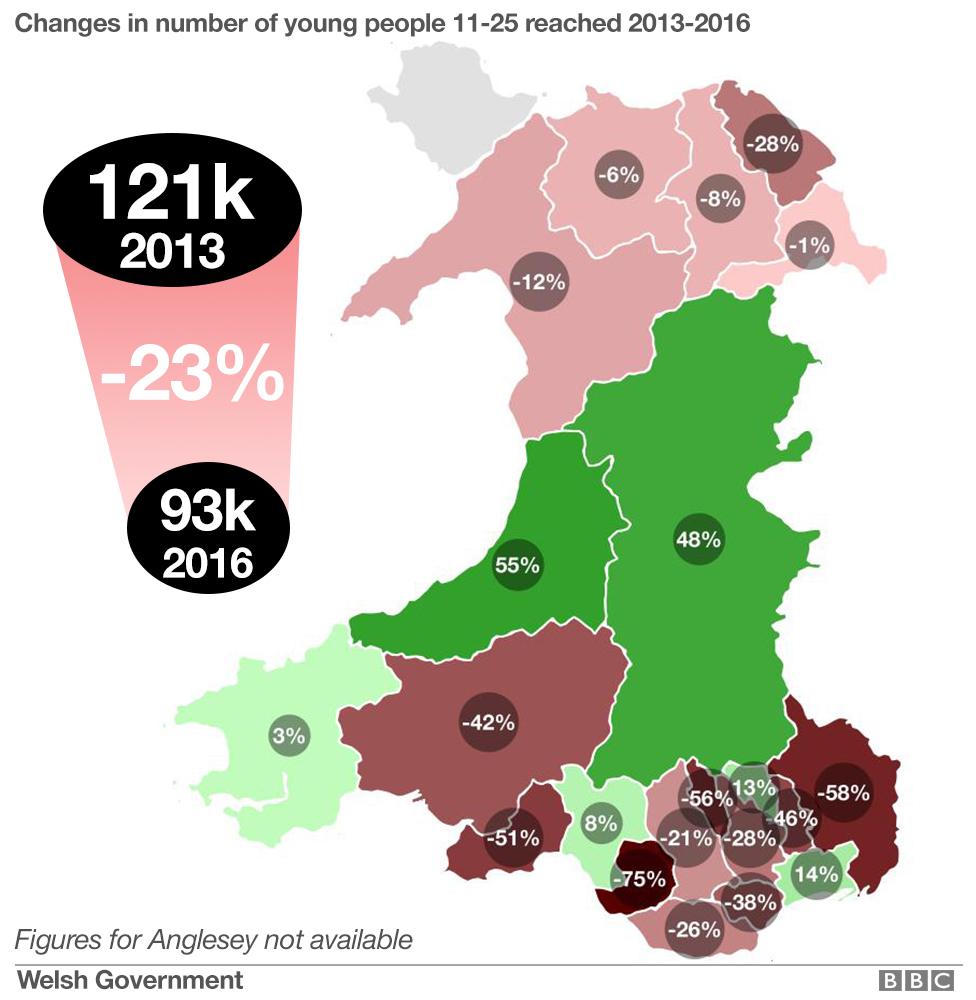Service cuts see young lives written off, claims union
- Published

The livelihoods of young people are being written off due to cuts to youth services budgets, union Unison has claimed.
About 100 centres have closed with 360 jobs cut in Wales in four years.
The union's Dominic MacAskill, called on councils to provide at least a "baseline" service.
But the Welsh Local Government Association said the lack of standard success measures made it a complex area for authorities.
Spending on youth work in Wales has dropped from £23m in 2013 to £19.3m in this financial year.
Full-time employees working in the sector have also fallen from 803 to 655, while numbers registered to a scheme are down from 102,700 to 93,400.
Across Wales, only 23% of eligible youngsters are engaged in youth schemes offered.
And a Welsh Assembly inquiry in December 2016 found an "alarming" decline in the number of services available.

Trade union Unison has called for fair funding and the involvement of youths in determining the future of provisions.
Its head of local government in Wales, Dominic MacAskill said: "At a crucial stage in their lives, young people desperately need the support well-qualified youth workers can provide."
He added cuts were "writing off the livelihoods and potential of so many Welsh youngsters" and called for a "baseline" or minimum standard of service across councils.
He believes supported youth workers alongside provisions in schools, open-access centres and on the streets is the "optimum solution".
"They [youth services] are not widely understood - most council tax payers don't use them," he said.
"So few voters protest [when they are changed or discontinued]."

The WLGA's Tim Opie believes that a lack of a universal measure of success of youth work could be a reason for the spending drop in such services.
He said often the results of youth work may not be seen until many years later - and so is not a priority for cash-strapped councils.
Mr Opie said: "You can never be sure if it's the [youth] work or something else has changed in people's lives. It is very difficult to link the intervention with the result."
He added that in addition to the lack of a success measure, councils also faced challenges in terms of the demographic area they served with a variation in the levels of affluence and poverty as well as the broad age range of the users of youth services going from 11 to 25.
It has led to a broad approach being adopted by Wales' councils.
Rural areas often employ more youth workers in order to reach as many young people as possible whereas urban areas need fewer staff as services are more accessible to young people.
Councils also use different measures of success according to the differing needs of areas. In Cardiff the focus is on the number of NEETs (Not in Employment, education or Training) whereas Gwynedd looks at the numbers attending youth clubs.
Other success measures are used across Wales including youth satisfaction surveys as well as how many of the youth population are reached.
Focuses also vary; in Pembrokeshire, workers visit an under-18s disco helping youngsters under the influence of drugs and alcohol get home, while in Merthyr Tydfil youth workers engage with young people in anti-social behaviour hotspots.
The Welsh Government called on local authorities to be "innovative" in their approach and look at different delivery methods, adding it intended to explore rollout of the provision across Wales.
- Published15 December 2016

- Published18 November 2016
